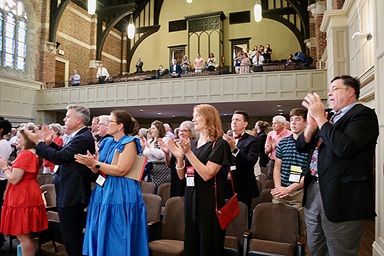
Video image by United Methodist News Service
The Connectional Conference Plan is the most thorough reorganization of The United Methodist Church under consideration at General Conference 2019.
The special gathering of the denomination’s top legislative assembly will work to clarify whether LGBTQ people will be free to get married in the church and be eligible for ordination.
It is the hardest to implement of the plans included in the Way Forward report prepared for the Feb. 23-26 gathering in St. Louis. Implementing the plan would require passage and ratification of several constitutional amendments.
“It requires the passage of nine constitutional amendments, takes several years to implement and involves a number of sequential actions and formal votes by targeted dates,” said Bishop Gary E. Mueller, the resident bishop of the Arkansas Area. “This is not a weakness. … While this full involvement may take more effort in the short-term, it will bear fruit in the long-term.”
The plan would replace the five U.S. jurisdictions with three connectional conferences ordered according to perspectives on sexuality. Central conferences — those outside the United States — could join one of the three connectional conferences in the United States, or start their own connectional conference.
U.S. annual conferences that disagree with the decision of their jurisdiction’s choice may vote to affiliate with a different connectional conference. Annual conferences outside the United States that disagree with the decision of their central conference could also join a different connectional conference.
Traditional, centrist and progressive connectional conferences are proposed. The cap on the number of connectional conferences would be eight.
“The Connectional Conference Plan starts with the assumption that The United Methodist Church’s longstanding difference of opinion concerning human sexuality is not a problem to be solved or even an issue to be managed,” Mueller said. “Rather, it is the presenting issue for the radically differing theological perspectives that will not go away, cannot be ignored and very well may increase.”
Plan options for GC2019
The One Church Plan
The Simple Plan
The Traditional and Modified Traditional plans
Patricia Miller, executive director of The Confessing Movement within The United Methodist Church and a member of the team that put the Connectional Conference plan together, said the charge for the team was “to have as much space between the theological differences as well as to have as much unity (as possible) within The United Methodist Church.”
“That’s very difficult, to accomplish both of these,” Miller said. Although she is one of the Way Forward Commission members who introduced the Connectional Plan legislation, Miller supports the Traditional Plan.
If enacted, the Connectional Conference Plan could affect partnerships in mission and ministry. Some general agencies — Wespath, United Methodist Publishing House, Archives and History, and the General Council on Finance and Administration – would continue unaffected. Others face changes based on how many connectional conferences wish to continue supporting them.
“I think it’s the most fair plan in terms of creating space for each of the various theological groups within the church,” said the Rev. Thomas Lambrecht, vice president and general manager of Good News and a member of the Way Forward Commission. Lambrecht was also a member of the team that worked on the Connectional Conference Plan, though he, too, supports the Traditional Plan.
The Connectional Conference Plan recognizes that an international church will contain members with varying viewpoints.
“This new way of being a church allows a looser connection instead of imposed disciplinary requirement that will be embraced by a younger generation that values diversity, flexibility and relationships,” Mueller said. He penned a commentary for United Methodist News Service urging more consideration of the Connectional Conference Plan but without endorsing any particular plan.
Among the connectional points are the Apostle’s and Nicene creeds, Charles Wesley’s hymns and John Wesley’s Standard Sermons and Explanatory Notes upon The New Testament.
Watch videos to learn more
“We need a UMC 2.0.”
Ritter foresees a major restructure in The United Methodist Church no matter what happens. He thinks the Connectional Conference Plan has the best chance of leaving the church stronger in the future.
Addressing concerns about the Connectional Conference Plan
Ritter said many who are concerned about being forced into a church that no longer reflects their spiritual beliefs don’t realize how separate the connectional conferences would be.
Patterson is a United Methodist News Service reporter in Nashville, Tennessee. Contact him at 615-742-5470 or newsdesk@umcom.org. To read more United Methodist news, subscribe to the free Daily or Weekly Digests.
Like what you're reading? Support the ministry of UM News! Your support ensures the latest denominational news, dynamic stories and informative articles will continue to connect our global community. Make a tax-deductible donation at ResourceUMC.org/GiveUMCom.


